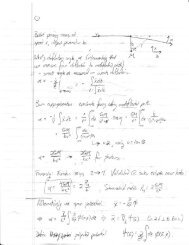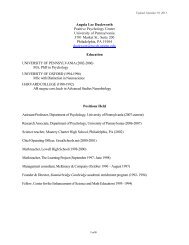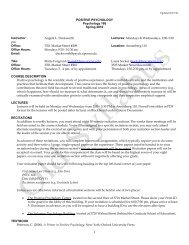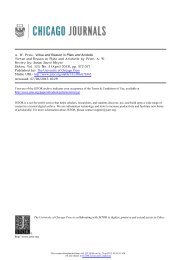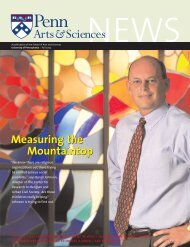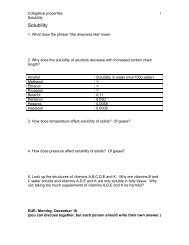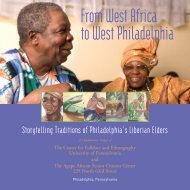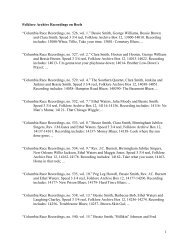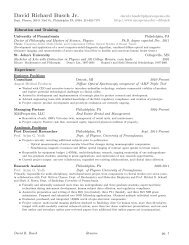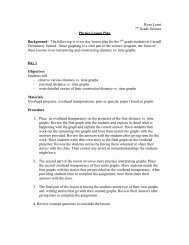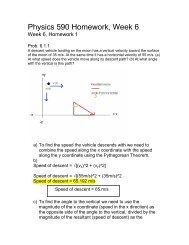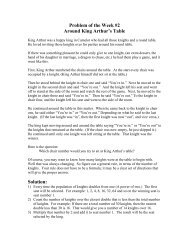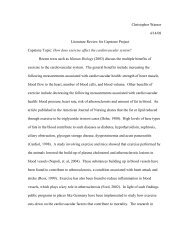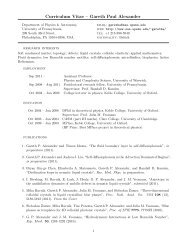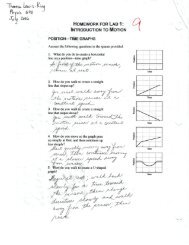PENN SUMMER - University of Pennsylvania
PENN SUMMER - University of Pennsylvania
PENN SUMMER - University of Pennsylvania
You also want an ePaper? Increase the reach of your titles
YUMPU automatically turns print PDFs into web optimized ePapers that Google loves.
This course will look at gender in Christianity, Islam, and Hinduism.<br />
By using historical, psychoanalytical, and anthropological tools, we<br />
will explore the various ways in which religion shapes gender roles<br />
and vice-versa. Aspects considered will include the representation <strong>of</strong><br />
the divine, the role <strong>of</strong> women in religious institutions, and rules regarding<br />
the human body, marriage, and sexuality. We will also take<br />
into consideration contemporary women’s self-representation in religious<br />
literature, art, and film.<br />
rels 173 910 MTWr 9:00am–10:35am Mcdaniel<br />
Introduction to Buddhism<br />
This course seeks to introduce students to the diversity <strong>of</strong> doctrines<br />
held and practices performed by Buddhists in Asia. By focusing on<br />
how specific beliefs and practices are tied to particular locations and<br />
particular times we will be able to explore in detail the religious institutions,<br />
artistic, architectural, and musical traditions, textual production<br />
and legal and doctrinal developments <strong>of</strong> Buddhism over time and<br />
within its socio-historical context. Religion is never divorced from its<br />
place and its time. Furthermore, by geographically and historically<br />
grounding the study <strong>of</strong> these religions we will be able to examine<br />
how their individual ethic, cosmological and soteriological systems<br />
effect local history, economics, politics, and material culture. We will<br />
concentrate first on the person <strong>of</strong> the Buddha, his many biographies<br />
and how he has been followed and worshiped in a variety <strong>of</strong> ways<br />
from Lhasa, Tibet to Phrae, Thailand. From there we touch on the<br />
foundational teachings <strong>of</strong> the Buddha with an eye to how they have<br />
evolved and transformed over time. Finally, we focus on the practice<br />
<strong>of</strong> Buddhist ritual, magic and ethics in monasteries and among lay<br />
communities in Asia and even in the West. This section will confront<br />
the way Buddhists have thought <strong>of</strong> issues such as “Just-War,” Women’s<br />
Rights and Abortion. While no one-quarter course could provide a<br />
detailed presentation <strong>of</strong> the beliefs and practices <strong>of</strong> Buddhism, my<br />
hope is that we will be able to look closely at certain aspects <strong>of</strong> these<br />
religions by focusing on how they are practiced in places like Nara,<br />
Japan or Vietiane, Laos.<br />
rUSSian<br />
russ 197 910 Tr 5:00pm–8:10pm Vinitsky<br />
Madness and Madmen<br />
Fulfills Humanities & Social Science Sector<br />
This course will explore the theme <strong>of</strong> madness in Russian literature<br />
and arts from the medieval period through the October Revolution <strong>of</strong><br />
1917. The discussion will include formative masterpieces by Russian<br />
writers (Pushkin, Dostoevsky, Tolstoy, Chekhov, and Bulgakov), painters<br />
(Repin, Vrubel, Filonov), composers (Mussorgsky, Tchaikovsky,<br />
and Stravinsky), and film-directors (Protazanov, Eisenstein), as well<br />
as non-fictional documents such as Russian medical, judicial, political,<br />
and philosophical treatises and essays on madness.<br />
russ 434 910 MW 4:30pm–7:40pm Todorov<br />
Media and Terrorism<br />
This course draws on fictional, cinematic, and mass-media representation<br />
<strong>of</strong> terrorism based on Russian as well as Western examples.<br />
We study how the magnitude <strong>of</strong> the political impact <strong>of</strong> terrorism<br />
relates to the historically changing means <strong>of</strong> production <strong>of</strong> its striking<br />
iconology. The course exposes students to major modes <strong>of</strong> imagining,<br />
narrating, showing, reenacting terrorism and forging its mystique.<br />
We examine the emergence <strong>of</strong> organized terrorism in nineteenthcentury<br />
Russia as an original political-cultural phenomenon. We trace<br />
its rapid expansion and influence on the public life in the West, and<br />
on the Balkans. Historical, political, and aesthetic approaches converge<br />
in a discussion <strong>of</strong> several case studies related to intellectual and<br />
spiritual movements such as nihilism, anarchism, populism, religious<br />
fundamentalism, and others. The public appearance <strong>of</strong> the terrorist<br />
activism and its major attributes are viewed as powerful intensifiers<br />
<strong>of</strong> its political effect: self-denial, ascetic aura, and stratagem <strong>of</strong> mystification,<br />
underground mentality, and martyrdom. The pedagogical<br />
goal <strong>of</strong> this course is to promote and cultivate critical view and analytical<br />
skills that will enable students to deal with different historical<br />
as well as cultural modes <strong>of</strong> (self-) representation <strong>of</strong> terrorism.<br />
Students are expected to learn and be able to deal with a large body<br />
<strong>of</strong> historical-factual and creative-interpreted information.<br />
SCienCe, TeChnoloGY, & SoCieTY<br />
sTsC 001 910 Tr 5:30pm–8:40pm schlombs<br />
The Emergence <strong>of</strong> Modern Science<br />
Crosslisted with: HSOC 001 910 / May be counted toward Humanities/Social<br />
Science or Natural Science/Math Sectors<br />
This course examines the development <strong>of</strong> humanity’s understanding<br />
<strong>of</strong> the natural world, from the dawn <strong>of</strong> Homo sapiens to the beginning<br />
<strong>of</strong> the 21st century. We will explore the history <strong>of</strong> scientific<br />
ideas, the social contexts that gave rise to them, and their social and<br />
human implications. Topics will include: ancient Greek and Roman<br />
learning; Medieval thought and the rise <strong>of</strong> universities; the age <strong>of</strong> exploration;<br />
the Copernican revolution; Galileo, the telescope, and the<br />
Church; Newton and the mechanical worldview; Enlightenment and<br />
Romantic science; industrialization and the rise <strong>of</strong> modern chemistry;<br />
Darwin and evolution; discoveries in electricity and magnetism;<br />
atomic physics, Einstein, the Bomb, and its aftermath; the emergence<br />
<strong>of</strong> modern genetics; the DNA revolution; computers and the information<br />
age; the exploration <strong>of</strong> space and the seas; and science and the<br />
human future.<br />
sTsC 003 910 Tr 5:30pm–8:40pm hintz<br />
Technology and Society<br />
Fulfills Society Sector / Crosslisted with: HSOC 003 910<br />
This survey course examines the ways that technology has shaped our<br />
societies and our relations with the natural world. We will trace the<br />
origin and impact <strong>of</strong> technological developments throughout human<br />
history and across the globe–from ancient cave paintings, primitive<br />
stone tools, and the pyramids, to medieval European cathedrals and<br />
windmills, to Victorian-era steam engines and railroads, to the atom<br />
bomb, the Internet, and genetic engineering. Throughout the course,<br />
we will consider the aesthetic, religious, and mythical dimensions <strong>of</strong><br />
technological change, focusing on the circumstances in which innovations<br />
emerge and their impact on social order, on the environment,<br />
and on the ways humans understand themselves. This course fulfills<br />
the Society sector <strong>of</strong> the General Requirement, is a core course for<br />
the Science, Technology and Society major, and an elective for the<br />
Health and Societies major.<br />
<strong>SUMMER</strong> SESSIOn I • MAY 24–JULY 2, 2010 25



